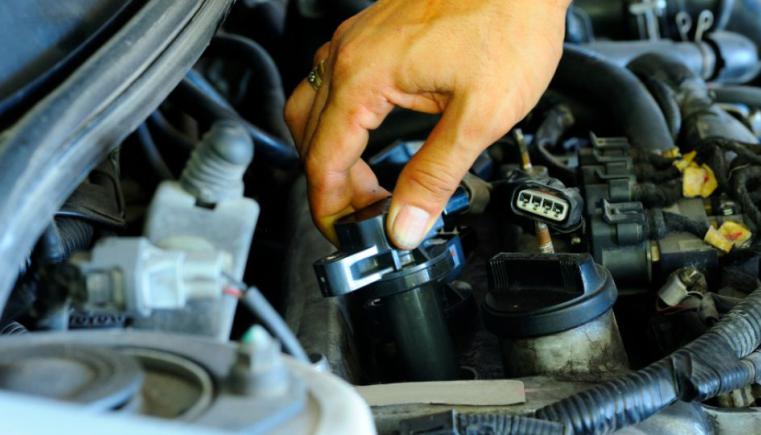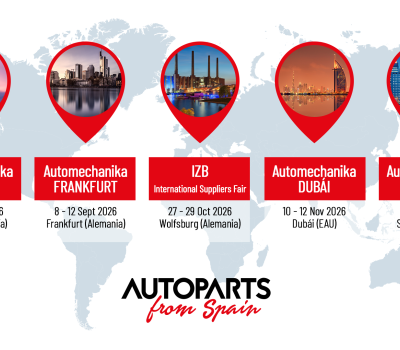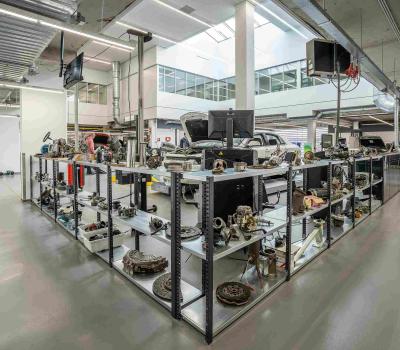This article explores in depth the technical aspects of the ignition coil, including its design, technology, manufacturing trends, and its impact on engine performance.
Ignition Coil Principle of Operation and Design
The main function of the ignition coil is to transform the low voltage from the battery (12V) into the high voltage required to ignite the air-fuel mixture in the combustion chamber. This voltage can exceed 30,000 volts, depending on the design and specifications of the ignition system.
The Key Components are
Primary and Secondary Windings
The primary winding consists of a reduced number of turns of thick wire, while the secondary winding contains thousands of turns of thinner wire.
The ratio between the windings determines the voltage transformation factor.
Magnetic Core
Made from materials such as iron or special alloys to maximize magnetic flux density and minimize losses.
Casing and Insulating Materials:
Designed to withstand extreme conditions, such as high temperatures, vibrations, and pollutants.
Functioning
The system operates through a charging and discharging cycle:
- Charging: Electric current flows through the primary winding, creating a magnetic field around the core.
- Discharging: When the current is interrupted, the magnetic field collapses, inducing a high voltage in the secondary winding, which is sent to the spark plug.
Types of Ignition Coils
- Conventional Coil: Used in mechanical distribution systems. This design includes a distributor that directs high-voltage current to the corresponding spark plugs. Although this system is obsolete in most modern vehicles, it remains relevant for classic cars and specific industrial applications.
- Electronic Coil: In electronic systems, the coils eliminate the need for a mechanical distributor. Instead, an electronic control module (ECM) regulates ignition, improving precision and reducing energy losses.
- Direct Coil (Coil-On-Plug): Designed to be mounted directly onto the spark plugs, eliminating high-tension cables. This results in lower energy loss and greater reliability. This design is common in modern and high-performance engines.
- Dual Ignition Coil: In engines with opposed cylinders or single configurations, a dual coil can power two spark plugs simultaneously, optimizing system design.
Challenges in the Ignition Coil Development
- Miniaturization: Space in engine compartments is limited, especially in hybrid and electric vehicles. Manufacturers must balance size reduction with heat dissipation and durability.
- High-Quality Materials: Using materials like ferrites and polymer composites improves efficiency and heat resistance but poses challenges in production costs.
- Electronic Integration: Building sensors and diagnostic systems into coils allows real-time monitoring but requires more complex designs and compatibility with vehicle architecture.
- Energy Efficiency: Manufacturers are optimizing coil efficiency to reduce electrical consumption and improve combustion, which is critical for hybrid and low-emission vehicles.
Future Applications
With the rise of electric vehicles, the role of the ignition coil might change, but its importance remains fundamental in hybrid combustion engines. Additionally, it is anticipated that AI-integrated coils with self-adjusting capabilities could set a new standard in the industry.
Leading Ignition Coil Manufacturers in Spain
In Spain, the following internationally recognized manufacturers specialized in the production of ignition coils and belonging to the Autoparts From Spain initiative are:
Anglí Industrias
Anglí Industrias, specialized in electrical equipment solutions, offers ignition coils designed to meet the most demanding industry standards.
FAE (Francisco Albero)
FAE, a benchmark in innovation and quality, their ignition systems combine advanced technology with compact design.
Lizarte
Lizarte, focused on reliability and performance, Lizarte develops coils ensuring optimal operation in various automotive applications.
The ignition coil is much more than a functional component it is a testament to the automotive engineering’s complexity and ingenuity. Its continuous evolution reflects the need to adapt to sustainability, efficiency, and performance demands. Companies such as Anglí Industrias, FAE, and Lizarte are leaders in this field, driving solutions that not only meet but exceed modern industry standards.



